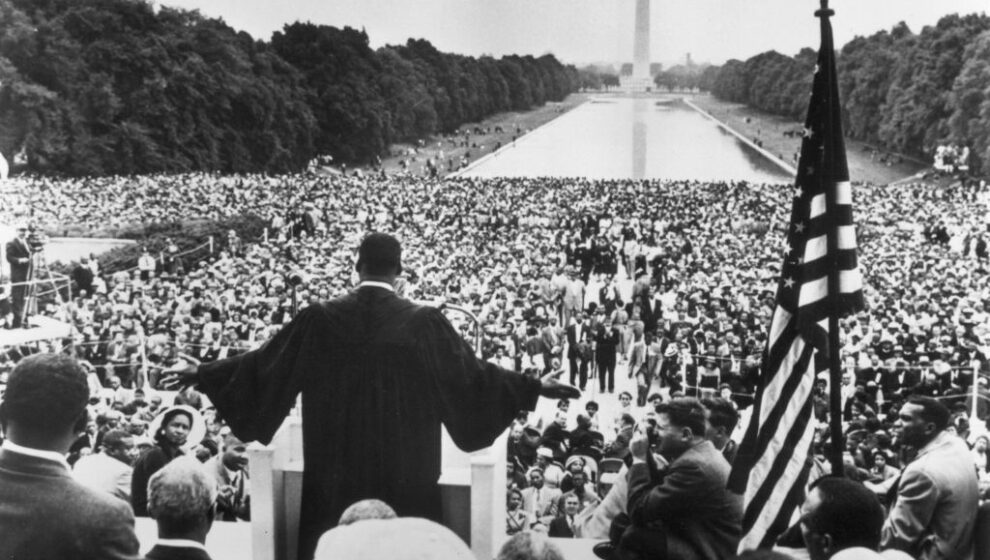Civil rights activist Martin Luther King Jr. famously gave one of the most powerful speeches of the 20th century—with Monday marking its 60th anniversary.
Key Details
- On August 28, 1963, King spoke before the National Mall in Washington, D.C., at a rally to encourage President John F. Kennedy to sign the Civil Rights Act.
- 250,000 converged in the city in an effort to pressure lawmakers to sign the bill, which President Lyndon Johnson would eventually sign on July 2, 1964.
- King’s I Have a Dream speech has become one of the most popular and quoted speeches of the 20th century. A full transcript of the speech is available here.
- Thousands of people commemorated the occasion on Saturday at the Lincoln Memorial, with civil rights activists decrying issues like gun control, voting discrimination, and alleged “book burning” efforts by Republican politicians, chanting “No Justice, No Peace.”
Why It’s Important
Martin Luther King Jr. remains one of the most celebrated and influential leaders of the 20th century, long since his tragic assassination in 1968. His words echo through every school and government building in the country and have inspired generations that followed him.
Many prominent current activists consider the work that King began as incomplete. Opinions are widely disparate on racial issues in modern America. An August 2021 Pew Charitable Trust study found that 75% of Black Americans believe recent pushes on issues of racial reconciliation have been a benefit to the country, while 54% of White Americans disagree.
Both sides generally agree that race relations have degraded in the past two decades. The percentage of Americans who believe race relations are very/somewhat good has decreased from 72% in 2004 to 44% in 2020. A 2019 Pew study argued that 56% of Americans saw race relations worsening after 2016. Older Black Americans are generally more optimistic about the state of things than their children, with those over the age of 50 (53%) saying Blacks and Whites get along well compared to those under 50 (33%).
The Problem
Unfortunately, both sides have very different visions of what a post-racial America can or ought to look like, which has turned controversial efforts like the New York Times 1619 Project into national scandals and fueled culture wars over how issues of race ought to be depicted in school curriculums.
King remains a complicated figure in light of these developments, both praised and reviled by elements of both sides of the aisle who want to use or discredit him as a weapon. Both mainstream Republicans and Democrats claim King as a member of their side, stating his powerful words and principles more closely align with their values—arguing he was both an anti-capitalist leftist and an icon of anti-wokeness. His words remain powerful tools six decades later.
Notable Quotes
“When the architects of our republic wrote the magnificent words of the Constitution and the Declaration of Independence, they were signing a promissory note to which every American was to fall heir. This note was a promise that all men—yes, Black men as well as white men—would be guaranteed the unalienable rights of life, liberty, and the pursuit of happiness,” says King.
“I have a dream that my four little children will one day live in a nation where they will not be judged by the color of their skin but by the content of their character,” he continues.
“This is our hope. This is the faith that I go back to the South with. With this faith, we will be able to hew out of the mountain of despair a stone of hope. With this faith, we will be able to transform the jangling discords of our nation into a beautiful symphony of brotherhood. With this faith, we will be able to work together, to pray together, to struggle together, to go to jail together, to stand up for freedom together, knowing that we will be free one day.”
